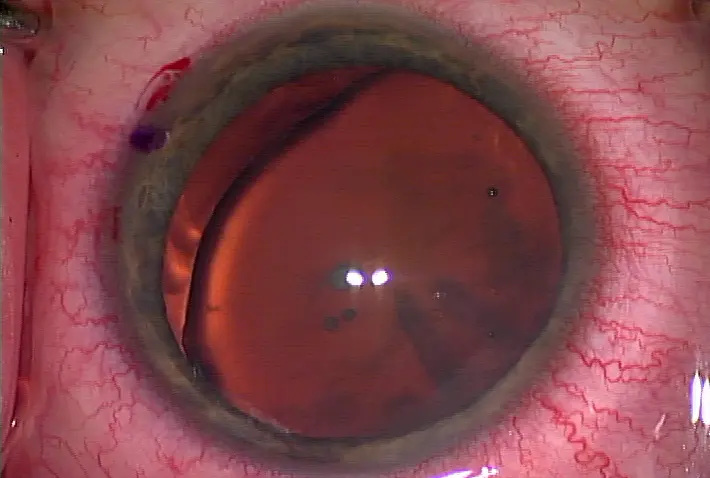Prostate cancer therapy may cause cataracts
August 2011‧Eye World
Prostate cancer therapy may cause cataracts
by Maxine Lipner Senior EyeWorld Contributing Editor
 |
| Androgen deprivation therapy for prostate cancer may put men at risk for developing cataracts (pictured here) Source: National Eye Institute, National Institutes of Health |
Androgen deprivation therapy may put lenses at risk
Men who have undergone androgen deprivation therapy (ADT) have a 9% increased risk of developing cataracts, according to results published in the March issue of the Annals of Epidemiology.
The study was inspired by the fact that other conditions such as diabetes and cardiovascular disease have been linked to cataract development, according to Jennifer L. Beebe-Dimmer, Ph.D., assistant professor, Wayne State School of Medicine, and Karmanos Cancer Institute, Detroit. "A lot of the recent literature on androgen deprivation therapy would suggest that men on ADT are at an increased risk for developing diabetes and cardiovascular disease, and certainly we have seen in the last 5 years increases in abdominal obesity," Dr. Beebe- Dimmer said. "We know that some of these things are associated with cataracts, so it makes sense that cataract might be another adverse consequence of ADT."
Included in the study were 65,852 prostate cancer patients identified through the National Cancer Institute's Surveillance, Epidemiology and End Results (SEER) registry, which is linked with the Medicare database. "These patients were 66 years and older because those are the only patients that we have Medicare data on," Dr. Beebe- Dimmer said. "We excluded those patients who were 65 at the time of diagnosis because we wanted to make sure that we had at least 12 months of medical history information on these patients so that we could assess their history of co-morbidities and cataract diagnosis."
However, investigators included patients with a history of cataract as long as it wasn't in both eyes. "Obviously patients with one cataract were still at risk for further cataracts," Dr. Beebe-Dimmer said.
Elevated cataract risk
Results showed that those who underwent ADT tended to have an elevated risk for cataracts. "We did find a very modest elevation in the risk for cataract associated with androgen deprivation," Dr. Beebe-Dimmer said. "This was after adjustment for the conventional risk factors that we had data on." It also seemed as if the relationship between androgen deprivation and cataract was slightly stronger among those patients without a history of cataract. Dr. Beebe-Dimmer said this makes sense. "If there is a causal relationship you would assume that in the patients with a prior history there are other more important driving factors," she said. "Among those patients without a history, orchiectomy showed the strongest association." Results showed that men who underwent orchiectomy had a 26% risk of developing cataracts compared with 9% for those on temporary ADT therapy.
"We never expected to see a particularly strong relationship because androgen deprivation therapy is so prevalent in this population and cataract is a fairly prevalent condition," Dr. Beebe-Dimmer said.
She is not ready to classify the relationship as causal, citing unmeasured factors. "This was exploratory, and further study in populations where we could measure more accurately the co-morbidity associated with cataract and control for these things in the analysis would be optimal," she said.
Possible mechanism
Dr. Beebe-Dimmer theorizes that the potential mechanism for a link between ADT and cataract would likely be tied to onset of diabetes or increasing weight in this population. "Those types of things would be the most natural explanation," she said. "I think that it's speculative at this point." She would like to see others conduct a prospective study on this. "One of the limitations of using SEER Medicare data was that these data weren't collected for this purpose, so we didn't get to gather all of the information that we needed," Dr. Beebe-Dimmer said. With the review data collected here, however, some misclassification is a possibility. "If the cataract history wasn't in the Medicare claims files, we didn't pick that up," she said. "We could have patients with cataract surgery in both eyes prior to ADT initiation who were included because we didn't have all of that information."
Going forward, if these results are born out, Dr. Beebe-Dimmer hopes that practitioners take a possible connection under advisement. "ADT is the only thing that we have right now, but we would assume that for a man who is at an increased risk for diabetes, cataract, or cardiovascular disease, as other therapies surface for treatment of prostate cancer, these men might be better off on some of the other therapies," she said. "Hopefully this will educate physicians and patients about the adverse consequences of androgen deprivation."
Editors' note: Dr. Beebe-Dimmer has no financial interests related to her comments.
Contact information
Beebe-Dimmer: 313-578-4209, dimmerj@karmanos.org



留言
張貼留言